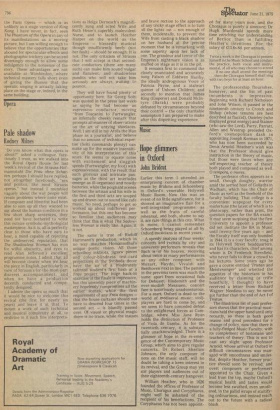Music
Hope glimmers in Oxford
John Bridcut
Earlier this term I attended an enterprising concert of chamber music by Brahms and Schoenberg in Oxford's venerable Holywell Music Room. Now this was an event of no little significance, for it showed an imaginative flair for a well-integrated programme, as well as the fruits of careful rehearsal, and both, shame to say it, are rare things in this city. What is more. I cannot remember Schoenberg being played at all by Oxford muSicians in recent years.
A speedy analysis of four weeks' concerts and recitals by city and university performers reveals that ',Bach 'is in his heaven, receiving about twice as many performances as any other composer, with Mozart, Haydn, Vivaldi and Beethoven next in line. The pattern in the previous term was much the same: apart from occasional fads for Debussy, Hindemith and the ever-modish Messiaen, concert fare is notoriously unadventurous. For a start, Oxford is dead to the world of mediaeval music: viol)players are hard to come by, and we seem to have conceded defeat to the enlightened forces at Cambridge, where Miss Jane Ryan holds the distinction of Professor of Viola da Gamba. As for the twentieth century, it is substantially unacknowledged. There is a glimmer of hope in the re-emergence of the Contemporary Music Group, which aims to give regular concerts. Dr Robert Sherlaw Johnson, the only composer of note on the music staff, will no doubt be taking a keen interest in its revival, and the Group may yet stir players and audiences out of their eighteenth-century hangover.
William Heather, who in 1626 founded the offices of Professor of Music, Choragus and Coryphaeus, might well be ashamed of the recipient of his benefactions. The Coryphaeus has not been appoint
SprrleiStatOr June 21, 1975
ed for many years now, and the Choragus is purely a sinecure; Dr Hugh Macdonald spends more time enriching our understanding of Berlioz than in fulfilling Heather's intentions. For the salary of E13.6s.8d, per annum,
Twice a week is the Choragus to present himself in the Music School and conduct the practice, both vocal and instrumental, of all who may choose to attend . . . If no one shall attend the meetings ... then the Choragus himself shall sing with two boys for at least an hour.
The professorship flourishes, however, and the list of past incumbents is impressive. Beginning with Richard Nicholson and John Wilson, it passed in the nineteenth century to Crotch and Bishop (whose tenures are best described as flaccid), Ouseley (who displayed great energy) and Stainer (who saw the Lord). Parry, Parratt, Allen and Westrup preceded Oxford's cosmopolitan dash in appointing Joseph Kerman in 1971, who has now been succeeded by Denis Arnold. Heather's wish was that the Professor should give instruction in the theory of music, but those were times when any self-respecting teacher of theory both played and composed as well. 0 tempora, o mores.
The professor often appears as a small, though doughty, warrior amid the serried host of Goliaths in Wadham, which has the Chair of Music as well as the freehold of the faculty building. That college is a convenient scapegoat for every misfortune (the latest of which is to photocopy, rather than print, the question papers for the BA exam). It may seem surpising that the first University to appoint a professor did not institute the BA in Music until twenty-five years ago — and the Faculty itself was only founded in 1944. It is a cosy faculty, snug in its Holywell Street headquarters, and has its characters, chief among whom is Dr Frederick Sternfield, who never fails to draw a crowd to his lectures. Some years ago he gave a course entitled 'Tristan and Meistersinger' and whetted the appetites of the historians in his audience by claiming (a trifle boastfully, I thought) to have received a letter from Richard Wagner. Needless to say, he never got further than the end of Act I of Tristan.
The illustrious list of past professors shows that the practical musicians held the upper hand until only receatly, so there is both good reason and good precedent for a change of policy, now that there is a fully-fledged Music Faculty, with its complement of historians and teachers of theory. This is not to cast any slight upon Professor Arnold, whose arrival at Oxford in difficult circumstances was managed with smoothness and smiles. But, despite Heather, former practice should soon be revived, and overt composers or performers appointed to the Chair. Given a, lead from the top, maybe Oxford's musical health and tastes would become less swathed, even smothered, in the pallid wraps of stultifying ordinariness, and instead reach out to the future with a radical blush.


































 Previous page
Previous page